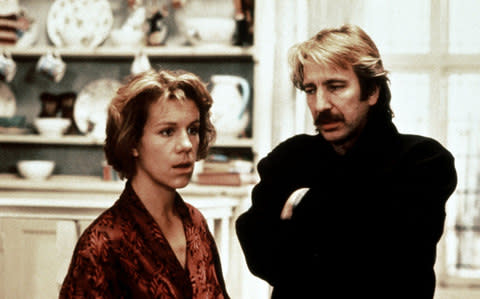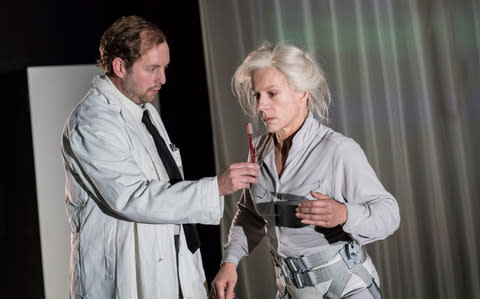Juliet Stevenson: I feel much more at home with the 'snowflake' generation than my own

“Women are definitely judged morally very, very differently to men,” says Juliet Stevenson, managing to sound both indignant and perfectly reasonable at the same. “You would have expected things to change over the years, but they haven’t, not fundamentally. We make progress and things slide back again.”
Stevenson, 60, one of Britain’s best-known stage actors, is well placed to comment on how hard it is to be a woman in this or any other age. She has just delivered a barnstorming sexually awoken Gertrude in Hamlet starring Andrew Scott, which ended earlier this month, and from Wednesday stars in Wings at the Young Vic as Emily, a fiercely independent aviator and wing walker whose sense of reality is destroyed by a stroke. Meanwhile in the Nazi legacy drama Let Me Go, which opened in cinemas last week, she plays Helga, a woman abandoned by her concentration camp guard mother in 1941 at the age of four, who passes on this sense of rejection to her own child.
The film, which is based on the memoir by Helga Schneider, follows four generations of women in the same family as they deal with the legacy of abuse and trauma. “It is a riveting, extreme story,” says Stevenson. “Helga loses her mother at four, and then learns it was to go off to be a camp officer at Auschwitz. And when they finally meet up, decades later, Helga discovers her mother is unrepentant. She is a monster.”

Stevenson adds: “It is such an extreme story, but it pulls at fears we deal with every day: isolation, terror, and feeling unloved or unparented. And it shows how abuse can be passed down generations, because the abused know no other language. In Helga’s family, she relates best to her own granddaughter. She clings to her.”
In real life, north London-based Stevenson, who has two children with her long-term partner anthropologist Hugh Brody, is part of a four-generation family too. Although not yet herself a granny – “I will be in that mode soon enough,” she says with relish, her 91-year-old mother Virginia has great-grandchildren thanks to Stevenson’s brother Johnny (who died in a car crash aged 48 in 2000). “I adore babies and tiny children,” she says, “I can’t wait to be a grandmother.”
The family are very close – there is another brother Tim – perhaps because they moved around every two years thanks to Stevenson’s father Michael who was an army officer. “My experience of life has been utterly and completely different to my mother’s. She had no opportunities. I had loads. I was free to make my own choices. My mum had to sacrifice her entire working life, trailing around the world as an army wife.”

She adds: “But then my age group were the first generation of women with full time careers and working lives, combined with hands-on parenting; really juggling like crazy.”
Perhaps this is why Stevenson feels closer in life experience to her son Gabriel, 16 and her daughter Rosalind, 23. “I think Rosalind has had the same freedoms I have had. In some ways, it is easier for her generation than ours. You don’t have to cut through politically at home the way we did, or certainly the way I did with my dad. We don’t have the same arguments. Our generation had a lot to resist; they don’t have so much.”
My age group were the first generation of women with full time careers and working lives, combined with hands-on parenting; really juggling like crazy
So does she recognise any truth to the “snowflake” tag which is often applied to the current generation of youngsters, implying they are too delicate for their and our own good? “No, not at all. I seem to have a houseful of young people all the time, friends and colleagues, university mates of my daughter, and I am completely inspired by them. There is so much hope in them. In fact, I feel much more at home with them than my own generation.”
Stevenson’s peer group included Alan Rickman with whom she starred – can it be 27 years ago? – in the much-loved Antony Minghella film Truly, Madly, Deeply. Both Rickman and Minghella have died since then, with Stevenson saying last year of Rickman’s death: “We feel we’ve lost our leader, we’ve lost of king. We all feel like we’ve lost the steering wheel in our car.”

But she is grateful for her new young work colleagues: Hamlet was directed by 30 -year-old Robert Icke; Wings is the creation of 36-year-old Natalie Abrahami, who also directed Stevenson in the critically acclaimed Happy Days in 2014. “I feel at home, that I have found my tribe.”
She appreciates, she says, the way young people are “very engaged with world affairs. They have no patience with our Parliamentary system. They say, let’s make something happen here, roll up their sleeves and to hell with it. No sitting around on committees, they do it through social media. I love that spirit.”
The selfie world means endlessly participating in narcissism and materialism. They don’t look out but in
Does she see them having a 1960s social revolution of their own then? “In a way, it is already happening: sit ins outside St Pauls, environmental activism, anti-globalist protest. There is a revolution going on but it’s not John Lennon and Yoko Ono sitting in bed, or putting flowers into the barrels of guns. It is much more.
“It’s the first time in history we don’t have to go through existing systems. Social media has freed young people, and so they’ve learnt to use it to raise money really quickly.” Stevenson has seen this at first hand though her work supporting refugees with the Citizens UK’s Safe Passage project in Calais.

However, she also sees the downside to social media which she points to creating a cult of the individual. “The selfie world means endlessly participating in narcissism and materialism. They don’t look out but in. I was stood on top of a mountain in Canada earlier this year and watched a couple come up slowly to the top. She was so dolled up. And they sat at the top, took a selfie, and started walking down. At no point did they look at the view.
“I saw the same thing in Austria; a couple taking a selfie of themselves in front of The Kiss by Gustav Klimt. It’s an insidious culture which makes people obsess about themselves and think individualistically. And once we behave as individuals, it is easier to divide us. Individualism is being encourage because it stops people coming together.”
This need for unity is partly what inspired her to get involved with the young refugees in Calais. “We have a responsibility to show kindness. If we don’t show them what it means to receive compassion and to be welcomed, how do we expect them to grow up be kind to others?” She sees a parallel to Helga and her daughter here – the way trauma can become like a fault line running through generations of family: “What kind of adults will they grow up to be if they feel abandoned and lost.

“Anyone with half a brain would know if we don’t help these young people we are laying down landmines for the future.”
That Stevenson is politically earnest is no surprise, but she points out that her family life is as madcap and demanding as anyone else’s. “We tease the hell out of each other. I’m a seriously hands-on mum; I love their kind of energy and sense of fun.”
She is quite house-proud too. “Our house is very busy – there’s a lot of human traffic through and that means it’s quite untidy. I do love spaces to have beauty in them but it’s a losing battle.
“So I am hellish busy, picking up between midnight and 2am, restoring the house to order – doing my chores.”
She laughs: “Maybe I like order at home because my life is chaotic. I’m always running up escalators and tubes, getting to places by the skin of my teeth.”
Let Me Go is on general release. Wings runs at the Young Vic from 20 September


